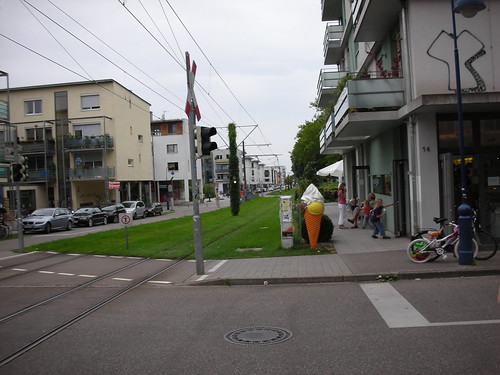Freiburg, a small city in Germany has become one of the role models for sustainable urban development in affluent regions. Freiburg is located in a prosperous region in Germany (the state of Baden-Wurrtemberg) a nation known for its automobile production and use. Even so, during the last 50 years Freiburg has taken a myriad of urban planning and policy steps resulting in a rather low car ownership and low car dependence.
Last year, I was on a tour in Germany where we also visited Freiburg and its celebrated new sustainable quarter called Vauban. This area was an abandoned French military camp, which was reused and turned into a very low car mixed-use residential quarter. The place was re-built using strong platform of cooperation between residents and the city government incorporating all kinds of sustainable solutions including integrated land-use and transportation planning. Freiburg’s light-rail was extended to the Vauban quarter, while parking was heavily restricted. Besides the overall urban plan, Vauban includes many unique sustainable experiments such as the solar settlement consisting of 59 units which produce more energy then they consume, employing solar panels (surprise!).
A paper titled “Sustainable Transport in Freiburg: Lessons from Germany’s Environmental Capital” and published at the “International Journal of Sustainable Transportation” sheds light on Freiburg’s path to sustainability, including several anecdotes and recommendations on what can be learned from the Germans’ experience. For example, it describes the way in which Vauban planners managed to avoid the 1:1 mandatory parking minimum ratio for residential developments in Germany:
After long negotiations, Vauban was granted a waiver for minimum parking requirements provided that enough green space was preserved for potential future construction of parking lots. Building permits in Vauban are issued for residential units without parking spots. Residents who decide to own a car can purchase a parking spot in one of the parking garages at the edge of the development for the equivalent of $25,000. Residents who wish to live car-free simply pay a one-time fee of $5,000 to preserve open space at the edge of the development— in lieu of a parking spot.
The authors also describe Freiburg’s streetcar decline and car use rise in the 1950’s and 1960’s which is similar to many other cities in the western world. Besides giving a comprehensive timeline on Freiburg’s sustainable urban planning decisions, the authors point out to an early event, a proposed nuclear plant in the 1970’s that helped form a partnership among many civic groups:
Moreover, during the early 1970s, the planned construction of a nuclear power
plant just 30km from Freiburg’s old town made environmental protection a critical issue (Hopwood 2007). Protests against the state government’s plan to build the nuclear power plant lasted for years and forged an unlikely alliance of leftist students, Catholic and Protestant church leaders, the conservative party, and local farmers. Highly respected civic leaders were at the center of the local opposition to the state government’s plan. Their role in the protests legitimized environmental protection and alternative development ideas for the local population (Chaney 2008;Hopwood 2007).Over the last 40 years Freiburg has developed a strong tradition of cooperation, negotiation, and consensus among city administration, citizen groups, and local businesses (Bratzel 1999). Public discourse, citizen participation, and cooperation paved the way for a gradual change towards sustainability in Freiburg (Bratzel 1999).
In the conclusion of the paper, seven lessons for implementing sustainable transport policies are specified as follows:
- Implement controversial policies in stages.
- Plans should be flexible and adaptable over time to changing conditions.
- Policies must be multi-modal and include both incentives and disincentives.
- Fully integrate transport and land-use planning.
- Citizen involvement must be an integral part of policy development and implementation.
- Support From higher levels of government is crucial to making local policies work.
- Sustainable transport policies must be long term, with policies sustained over time, for lasting impact.
It should be noted that Freiburg does not have a transportation planning division, but an integrated urban planning department that combines transportation and land-use planning. This is probably the easiest recommendation to implement (number 4 above) – abolish municipal transportation departments and merge them inside land-use planning. The city keeps growing at a modest pace and is currently planning a new quarter for 10,000 people which will probably rise to new fame when its built.
You can read the full paper on Freiburg’s sustainable urban development here.


Reblogged this on This is sustainability.